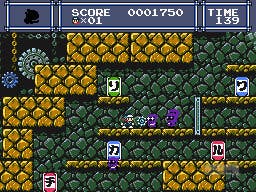Retro Game Challenge
Something old, something new.
Shinya Arino is the man Dr Kawashima might have become if he'd blown his student loan on shoot-'em-ups and Mario plushies, and spent all of his time playing videogames at medical school instead of studying. Like Kawashima in Brain Training, Arino presents his game in the form of a disembodied head, issuing challenges designed to test your reflexes, nerve and cunning. But while Nintendo's health-'em-up is concerned with testing your mental dexterity, Arino's purpose is simply to test your skill at videogames, specifically the kind of 8-bit Japanese classics of the mid-1980s.
It's difficult to pinpoint exactly when nostalgia became an aesthetical choice for contemporary game developers. But titles such as Capcom's Megaman 9 prove that a return to the rudimentary sprites and chiptune of the medium's beginnings through design rather than necessity can yield compelling results. Retro Game Challenge takes the 8-bit pastiche to its extreme, presenting an entire collection of Famicom (NES) titles that never were; new creations dressed as old ones, each one given a fake release date and make-believe magazine coverage. Precision-designed to appeal to 25-35-year-old gamers, Retro Game Challenge seeks to recreate that heady experience of being an 8-year-old hardcore videogame fan in the 1980s, a task to which it applies itself with thrilling relish.
Retro Game Challenge is based on a Japanese retro gaming television show, Game Centre CX, of which Shinya Arino is the presenter. At the start of the game Arino winds the clock back to the early 1980s, just as Nintendo's Famicom is gaining widespread popularity around the world. Here the young Arino and your character sit cross-legged on tatami mats in his family home, staring into a 14-inch CRT television set playing the latest titles together in that innocent and unquestioning way that only two 8-year-old gamers can.

To begin with the young Arino owns just one cartridge, a Galaga-style shoot-'em-up called Cosmic Gate, but, as you clear challenges you're given access to new fictional Famicom games across a variety of genres. Each title parodies an actual classic, the top-down racer Rally King taking off the Famicom's Grand Prix II, the vertical shoot-'em-up Star Prince loosely based on Star Soldier and the JRPG Guardia Quest heavily influenced by early Dragon Quest. In every case the parody is pitch perfect, from the awkward Japlish text that punctuates the intro and outro of each title, to the expressive sprite work and authentic in-game fonts.
The adult Arino (he of the disembodied head) tasks the player with four challenges for each game. These must be tackled and completed in an order, each successful completion unlocking the next objective. As with contemporary achievements and trophies, Arino's challenges encourage you to play the game in interesting and unusual ways. While some challenges simply require you to pass a certain score threshold or to complete a set number of stages, many are more creative, asking that you complete a level without using a certain move (such as drifting in Rally King XP, or throwing a ninja star in Robot Ninja Haggle Man) or that you find and save your game in a remote town in Guardia Quest. No task takes more than 20 minutes to complete and many take a great deal less time, ensuring that you rarely get bored of your assignments.

